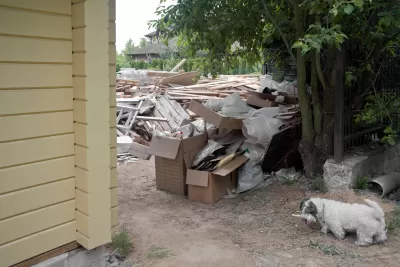Local officials in Gilbert, Arizona, say a new town ordinance that will fine homeowners for unsightly debris in their backyards is about fighting blight; critics say it’s a violation of their Fourth Amendment right against unreasonable search and seizure.

Gilbert, Arizona—home of the 2015 sign code case heard round the planning world, Reed v. Town of Gilbert—is in the news again for a new town ordinance the city says is aimed at battling blight. According to local news outlet 12 News, the Gilbert Town Council recently voted 5-1 “to adopt the Community Preservation Ordinance that would fine homeowners up to $500 for having dead grass, piled up debris, and cars that don't work in their yards.” While that might not seem all that unusual, what sets this ordinance apart is it applies to homeowners’ backyards (previously the town could only address blight if it posed life and safety issues and only in front and side yards, according to an article from Gilbert US News) and heavily relies on neighbors reporting on neighbors.
Golightly spoke to Gilbert resident Chris Lindahl who is concerned the ordinance “gives the town too much power and control over people's yards. He also didn't like the idea that neighbors who lives in two story houses could look into his backyard and report him to Code Compliance if they didn't like what they saw.” He sees it as a potential violation of the Fourth Amendment, which protects people from unreasonable searches and seizures by the government.
Town planning manager Eva Cutro told 12 News that the ordinance is aimed at preserving the community from blight and said the ordinance has written protections so that state and constitutional rights will not be violated. “She also said they will report to the council every three months to make sure the system is not being abused and will make changes to the ordinance if necessary. Cutro added that they do not plan on giving citations out right away and plan on working with homeowners first to get the problem situated.”
The lone dissenter town council, Councilman Jim Torgeson, told Gilbert US News, he understands the need for such an ordinance but is concerned with its dependence on use of discretion by code compliance officers, but might that lead to inconsistent enforcement of the ordinance?

Alabama: Trump Terminates Settlements for Black Communities Harmed By Raw Sewage
Trump deemed the landmark civil rights agreement “illegal DEI and environmental justice policy.”

Planetizen Federal Action Tracker
A weekly monitor of how Trump’s orders and actions are impacting planners and planning in America.

The 120 Year Old Tiny Home Villages That Sheltered San Francisco’s Earthquake Refugees
More than a century ago, San Francisco mobilized to house thousands of residents displaced by the 1906 earthquake. Could their strategy offer a model for the present?

Downtown Pittsburgh Set to Gain 1,300 New Housing Units
Pittsburgh’s office buildings, many of which date back to the early 20th century, are prime candidates for conversion to housing.

Trump Administration Could Effectively End Housing Voucher Program
Federal officials are eyeing major cuts to the Section 8 program that helps millions of low-income households pay rent.

NRDC Releases State Transportation Scorecard
The Getting Transportation Right report highlights which states are making the most progress on reducing transportation emissions and improving access to clean transportation options.
Urban Design for Planners 1: Software Tools
This six-course series explores essential urban design concepts using open source software and equips planners with the tools they need to participate fully in the urban design process.
Planning for Universal Design
Learn the tools for implementing Universal Design in planning regulations.
Clanton & Associates, Inc.
Jessamine County Fiscal Court
Institute for Housing and Urban Development Studies (IHS)
City of Grandview
Harvard GSD Executive Education
Toledo-Lucas County Plan Commissions
Salt Lake City
NYU Wagner Graduate School of Public Service



























